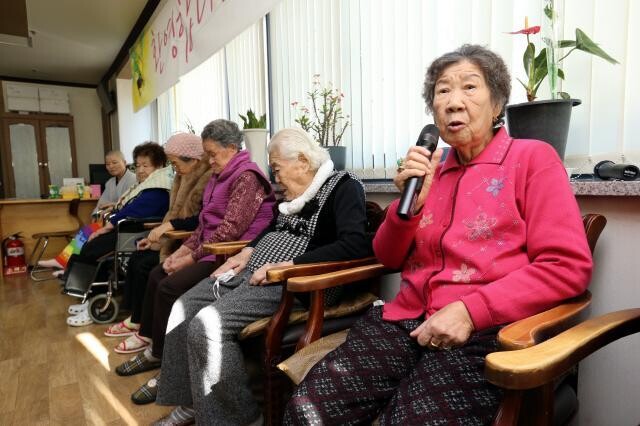hankyoreh
Links to other country sites 다른 나라 사이트 링크
Court dismisses comfort women’s suit against government for signing 2015 agreement with Japan

A suit filed by Japanese military comfort women survivors to demand damages from the South Korean government for signing a 2015 agreement with Japan was dismissed by the court that received it.
The 20th civil division of Seoul Central District Court, presided by the Hon. Judge Mun Hye-jeong, ruled on June 15 to dismiss the plaintiffs’ demand for damages, holding them responsible for all litigation costs.
In its decision, the court said the intergovernmental comfort women agreement “certainly lacked transparency or was deficient in recognizing ‘legal responsibility’ and on the nature of the one billion yen provided by the Japanese government.”
At that same time, it concluded that “an examination of the process and content leading up to the agreement cannot be seen as discharging the plaintiffs’ right to claim damages.”
“Even when it is considered that diplomatic actions constitute a domain in which broad discretion is allowed between states, the government cannot be seen as having perpetrated an illegal action,” it said.
On Dec. 28, 2015, the Park Geun-hye administration reached an agreement with the Japanese government on the comfort women issue, with the wording including an affirmation that the issue would be “finally and irreversibly resolved.”
Twelve survivors of sexual enslavement by the Japanese military, including Kang Il-chul, filed suit against the South Korean government in Aug. 2016 to demand 1.2 billion won (US$1.1 million) in damages, claiming that the government had nullified the victims’ individual rights to claim damages from Japan by signing an agreement not to demand further legal responsibility without consulting with the victims themselves.
The survivors also said the 2015 agreement with Japan was in violation of a 2011 Constitutional Court ruling demanding that the South Korean government “offer its cooperation and protection so that citizens whose human dignity and values have been violated through illegal actions perpetrated by Japan can invoke their rights to demand damages from Japan.”
3 of 12 survivors who took part in suit have since passed away
The elderly comfort women survivors themselves were absent from the hearing that day for health reasons. Indeed, three of the 12 survivors who took part in the suit in 2016 have since passed away. After the court’s decision, Lee Sang-hee, an attorney representing the survivors, said they would be appealing the court’s decision.
“Did the court’s decision not ultimately recognize the lawfulness of the 2015 South Korea-Japan agreement?” Lee asked while speaking to reporters.
“Only when the unconstitutionality of the South Korea-Japan agreement is recognized will the South Korean government use that as a basis for continued attempts to resolve the Japanese military comfort women issue,” she added. “I’m worried what kind of message this ruling will send the Ministry of Foreign Affairs.”
“This ruling could have been a way for the South Korean government to express to the women its commitment to not giving up and to carrying on until the end to resolve the issue,” she continued.
“After this decision, I’m worried what the women will think.”
By Ko Han-sol, staff reporter
Please direct comments or questions to [english@hani.co.kr]

Editorial・opinion
![[Column] Park Geun-hye déjà vu in Yoon Suk-yeol [Column] Park Geun-hye déjà vu in Yoon Suk-yeol](https://flexible.img.hani.co.kr/flexible/normal/500/300/imgdb/original/2024/0424/651713945113788.jpg) [Column] Park Geun-hye déjà vu in Yoon Suk-yeol
[Column] Park Geun-hye déjà vu in Yoon Suk-yeol![[Editorial] New weight of N. Korea’s nuclear threats makes dialogue all the more urgent [Editorial] New weight of N. Korea’s nuclear threats makes dialogue all the more urgent](https://flexible.img.hani.co.kr/flexible/normal/500/300/imgdb/original/2024/0424/7317139454662664.jpg) [Editorial] New weight of N. Korea’s nuclear threats makes dialogue all the more urgent
[Editorial] New weight of N. Korea’s nuclear threats makes dialogue all the more urgent- [Guest essay] The real reason Korea’s new right wants to dub Rhee a founding father
- [Column] ‘Choson’: Is it time we start referring to N. Korea in its own terms?
- [Editorial] Japan’s rewriting of history with Korea has gone too far
- [Column] The president’s questionable capacity for dialogue
- [Column] Are chaebol firms just pizza pies for families to divvy up as they please?
- [Column] Has Korea, too, crossed the Rubicon on China?
- [Correspondent’s column] In Japan’s alliance with US, echoes of its past alliances with UK
- [Editorial] Does Yoon think the Korean public is wrong?
Most viewed articles
- 1‘We must say no’: Seoul defense chief on Korean, USFK involvement in hypothetical Taiwan crisis
- 2N. Korean delegation’s trip to Iran shows how Pyongyang is leveraging ties with Moscow
- 3[Column] Park Geun-hye déjà vu in Yoon Suk-yeol
- 4Amnesty notes ‘erosion’ of freedom of expression in Korea in annual human rights report
- 5‘Weddingflation’ breaks the bank for Korean couples-to-be
- 646% of cases of violence against women in Korea perpetrated by intimate partner, study finds
- 7[Reportage] On US campuses, student risk arrest as they call for divestment from Israel
- 8“Parental care contracts” increasingly common in South Korea
- 9[Interview] Dear Korean men, It’s OK to admit you’re not always strong
- 10Korean government’s compromise plan for medical reform swiftly rejected by doctors